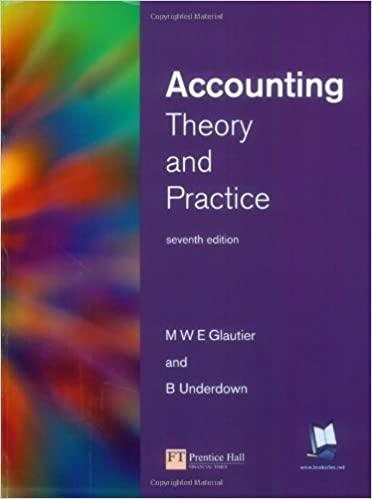Question
The beginning inventory at Midnight Supplies and data on purchases and sales for a three-month period ending March 31, are as follows: Date Transaction Number
The beginning inventory at Midnight Supplies and data on purchases and sales for a three-month period ending March 31, are as follows:
| Date | Transaction | Number of Units | Per Unit | Total | |
|---|---|---|---|---|---|
| Jan. | 1 | Inventory | 2,600 | $54.00 | $140,400 |
| 10 | Purchase | 7,000 | 62.00 | 434,000 | |
| 28 | Sale | 3,850 | 108.00 | 415,800 | |
| 30 | Sale | 1,300 | 108.00 | 140,400 | |
| Feb. | 5 | Sale | 500 | 108.00 | 54,000 |
| 10 | Purchase | 17,500 | 64.00 | 1,120,000 | |
| 16 | Sale | 8,700 | 113.00 | 983,100 | |
| 28 | Sale | 8,600 | 113.00 | 971,800 | |
| Mar. | 5 | Purchase | 14,000 | 65.60 | 918,400 |
| 14 | Sale | 10,100 | 113.00 | 1,141,300 | |
| 25 | Purchase | 3,300 | 66.00 | 217,800 | |
| 30 | Sale | 7,750 | 113.00 | 875,750 | |
| Instructions | |
| 1. | Record the inventory, purchases, and cost of merchandise sold data in a perpetual inventory record similar to the one illustrated in Exhibit 3 , using the first-in, first-out method. |
| 2. | Determine the total sales and the total cost of merchandise sold for the period. Journalize the entries in the sales and cost of merchandise sold accounts. Assume that all sales were on account and date your journal entry March 31. Refer to the Chart of Accounts for exact wording of account titles. |
| 3. | Determine the gross profit from sales for the period. |
| 4. | Determine the ending inventory cost as of March 31. |
| 5. | Based upon the preceding data, would you expect the inventory using the last-in, first-out method The method of inventory costing based on the assumption that the cost of merchandise sold is the cost of the most recent purchases. to be higher or lower? |
FIFO
1. Record the inventory, purchases, and cost of merchandise sold data in a perpetual inventory record similar to the one illustrated in
Exhibit 3
, using the first-in, first-out method.
| Date | Purchases | Cost of Merchandise Sold | Inventory | ||||||
| Quantity | Unit Cost | Total Cost | Quantity | Unit Cost | Total Cost | Quantity | Unit Cost | Total Cost | |
| Jan. 1 | |||||||||
| 10 | |||||||||
| 10 | |||||||||
| 28 | |||||||||
| 28 | |||||||||
| 30 | |||||||||
| Feb. 5 | |||||||||
| 10 | |||||||||
| 10 | |||||||||
| 16 | |||||||||
| 16 | |||||||||
| 28 | |||||||||
| Mar. 5 | |||||||||
| 5 | |||||||||
| 14 | |||||||||
| 14 | |||||||||
| 25 | |||||||||
| 25 | |||||||||
| 30 | |||||||||
| 30 | |||||||||
| 31 | Balances | ||||||||
3. Determine the gross profit from sales for the period.
Points:
Feedback
Check My Work
Explanation
4. Determine the ending inventory cost as of March 31.
Points:
Feedback
Check My Work
Explanation
5. Based upon the preceding data, would you expect the inventory using the last-in, first-out method
The method of inventory costing based on the assumption that the cost of merchandise sold is the cost of the most recent purchases.
to be higher or lower?
Higher
Lower
Step by Step Solution
There are 3 Steps involved in it
Step: 1

Get Instant Access to Expert-Tailored Solutions
See step-by-step solutions with expert insights and AI powered tools for academic success
Step: 2

Step: 3

Ace Your Homework with AI
Get the answers you need in no time with our AI-driven, step-by-step assistance
Get Started


